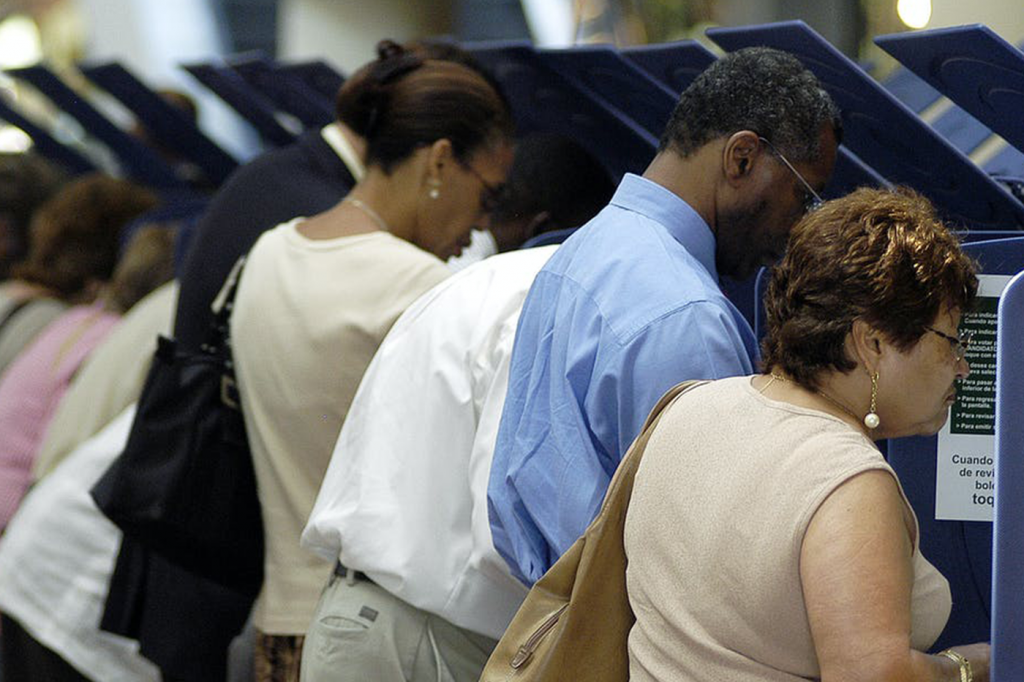FOR IMMEDIATE RELEASE
Contact: Alberto Lammers
alammers@luskin.ucla.edu
Federal Court Allows Dodge City At-large Lawsuit to Move Forward to Trial
Judge denies defendants’ motion for summary judgment in the case, which challenges the unlawful dilution of voting power of Latine residents
DODGE CITY, Kan. (December 13, 2023) – A federal court has denied the City of Dodge City’s motion for summary judgment in a lawsuit challenging its at-large voting system. The case will now proceed to trial, beginning Feb. 24, 2024, in Wichita, Kansas, before Chief Judge Eric Melgren of the United States District Court for the District of Kansas.
The case centers on Dodge City’s at-large election system for the city commission. Dodge City, which is located in Ford County in southwest Kansas, is not divided into multiple voting districts. Rather, members of the commission are elected “at large,” meaning they are elected by voters from across the entire city. This system unlawfully dilutes the vote of Latine residents.
The plaintiffs’ legal team released the following joint statement:
“Dodge City’s at-large voting system is contrary to federal law, and works to dilute the political voices of its large Latine community. We are gratified the court has seen the significance of Dodge City’s maintenance of this unlawful scheme, and that our clients will have a chance to have their voices heard in court – an opportunity they have not had as voters. ”
The lawsuit, Coca v. City of Dodge City, was filed in December 2022 by the UCLA Voting Rights Project, ACLU of Kansas, American Civil Liberties Union, and Cleary Gottlieb Steen & Hamilton, LLP against Dodge City and its Commissioners, alleging violations of the Section 2 of the federal Voting Rights Act of 1965 and the U.S. Constitution’s 14th Amendment Equal Protection Clause.
Latine residents make up 65% of Dodge City’s total population, 59% of its voting-age population, and 46% of its citizen voting-age population. Despite growing quickly over time, the Latine population is underrepresented on the commission because the city’s white population has largely voted as a bloc against their preferred candidates. Expert analysis of elections from 2014 and 2022 provided to the court found clear evidence that Hispanic-preferred candidates receive significantly higher support in heavily Hispanic districts but perform poorly in heavily white districts, typically costing them the election.
Historically, at-large voting districts worked to reinforce suppression of racial minorities and the working class across the United States. Their impacts are seen in present-day inequalities in income and poverty, educational attainment, housing, health indicators, and other socio-demographic measures.
# # #
About the ACLU of Kansas: The ACLU of Kansas is the statewide affiliate of the national American Civil Liberties Union. The ACLU of Kansas is dedicated to preserving and advancing the civil rights and legal freedoms guaranteed by the United States Constitution and the Bill of Rights. For more information, visit our website at www.aclukansas.org.
About the UCLA Voting Rights Project: The UCLA Voting Rights Project is the marquee advocacy project of the UCLA Latino Policy and Politics Institute at the University of California, Los Angeles, and is focused on voting rights litigation, research, policy, and training. The UCLA Voting Rights Project addresses monumental and overlooked gaps in the field of voting rights: how to train young lawyers and researchers, support the development of new legal and methodological theories for voting rights cases, and how to advance policy work to ensure that there is a new generation of leaders who are pursuing efforts to guarantee all citizens have equal and fair access to our democracy. The project was founded by Chad W. Dunn, J.D., and Matt Barreto, Ph.D. The UCLA Voting Rights Project is located within the Luskin School of Public Affairs. To learn more about the UCLA Voting Rights Project, please visit latino.ucla.edu/votingrights.
*Latine is the gender neutral of Latino and Latina. The complaint and this release use Latine/Hispanic interchangeably to refer to individuals who self-identify as Latine or Hispanic. When referring to certain population data, the terms “Hispanic” or “Hispanic or Latino” mean non-white persons of “Hispanic” or “Hispanic or Latino” origin as defined by the United States Census Bureau and U.S. Office of Management and Budget.

